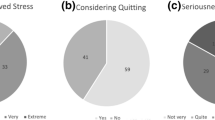Abstract
Postgraduate residency training requires young physicians to make the difficult transition from student to doctor. Recent evidence suggests that this period is associated with significant depression, anger, cynicism and emotional withdrawal, and there are concerns about its effect on the attitudes and future functioning of physicians. The perceived stresses are not unique to physicians and represent, in part, a need for personal growth that is common in the human service professions. Training programs can be more helpful to residents as they move through this transition. More attention must be paid to needs for sleep and time away from the hospital. Residents require more support and guidance in the personal aspects of becoming a physician, and programs can do much better at helping residents develop the communication skills needed to be an effective physician. The benefit of these efforts may be the development of physicians less likely to become impaired and more likely to give competent humane care to their patients.
Similar content being viewed by others
References
Harwood M: The ordeal—life as a medical resident. NY Times Magazine, June 3, 1984, p. 39
Shem S: The house of God. New York: Richard Merek; 1978
Cook R: The year of the intern. New York: Harcourt, Brace, Jovanovich, 1972
Cousins N: Internship: preparation or hazing? JAMA 1981;245:377
Valko RJ, Clayton PJ: Depression in the internship. Dis Nerv Syst 1975;36:26–9
Reuben DB: Depressive symptoms in medical house officers: effects of level of training and work rotation. Arch Intern Med 1985;154:286–8
Reuben DB: Psychologic effects of residency. South Med J 1983;76:380–3
Bates EM, Carroll PJ: Stress in hospitals: the married intern: vintage 1973. Med J Aust 1975;2:763–5
Coombs RH, Boyle BP: The transition to medical school: expectations versus realitiies. In: Coombs RH, Vincent CE, eds. Psychosocial aspects of medical training. Springfield, Illinois: Charles C Thomas, 1971
Friedman RC, Bigger ST, Kornfeld DS: The intern and sleep loss. N Engl J Med 1971;285:201–3
Mumford E: Interns: from students to physicians. Cambridge, Massachusetts: Harvard University Press, 1970
Cherniss C: Professional burnout in human service organizations. New York: Praeger, 1980
Scheiber SC, Doyle BB: The impaired physician. New York: Plenum Medical Book Co., 1983
Thomas RB, Luber SA, Smith JA: A survey of alcohol and drug use in medical students. Dis Nerv Syst 1977;38:41–3
Ross M: Suicide among physicians. Psychiat Med 1971;2:189–98
Tokarz JP, Bremer W, Peters K: Beyond survival. Chicago: American Medical Association, 1979
Eron LD: Effect of medical education on medical student’s attitudes. J Med Educ 1955;30:559–66
McCue JD: The distress of internship: causes and prevention. N Engl J MEd 1985;312:449–52
Girard DE, Elliot DL, Hickam DH, et al: The internship: a prospective investigation of emotions and attitudes. Western J Med. In Press.
Adler R, Werner ER, Korsch B: Systematic study of four years of internship. Pediatrics 1980;66:1000–8
Girard DE, Sack RL, Reuler JB, Chang MK, Nardone DA: Survival of the medical internship. Forum Med 1980;3:460–3
Uliana RL, Hubbell A, Wyle FA, Gordon GH: Mood changes during internship. J Med Educ 1984;59:118–23
Gorlin R, Zucker HD: Physicians’ reaction to patients: a key to teaching humanistic medicine. N Engl J Med 1983;308:1059–63
McCue JD: The effects of stress on physicians and their medical practice. N Engl J Med 1982;306:458–63
Vaillant GE, Sobowale NC, McArthur C: Some psychologic vulnerabilities of physicians. N Engl J Med 1972;287:372–5
Werner ER, Korsch BM. The vulnerability of medical students: posthumous presentation of L.L. Stephen’s ideas. Pediatrics 1976;57:321–8
Marwardi BH: Satisfactions, dissatisfactions and causes of stress in medical practice. JAMA 1979;241:1483–6
Ziegler JL, Kanas N, Strull WM, Bennet NE: A stress discussion group for medical interns. J Med Educ 1984;59:205–7
Tolle SW, Girard DE: The physician’s role in the events surrounding patient death. Arch Intern Med 1983;143:1447–9
Haney CA: In Coombs RH, Vincent CE, eds. Psychological aspects of medical training. Springfield, Illinois, Charles C Thomas, 1971
Funkenstein DH: The learning and personal development of medical students and the recent changes in universities and medical schools. J Med Educ 1968;43:883–97
Ellard J: The disease of being a doctor. Med J Aust 1974;2:318–22
Rinke CM: The professional identities of women physicians. JAMA 1981;245:2419–21
Nadelson C, Notman MT: The woman physician. J Med Educ 1972;47:176–83
Notman MT, Nadelson CC: Medicine: a career conflict for women. Am J Psychiat 1973;130:1123–7
Potter RC: Resident, woman, wife, mother: issues for women in training. J Am Med Women Assoc 1983;38:98–102
Greganti MA, Fletcher SW: House staff pregnancy in internal medicine residencies. Ann Intern Med 1985;102:123–5
Swerdlow AJ, McNeilly RH, Rue ER: Woman doctors in training: problems and progress. Br Med J 1980;281:754–8
Vaillant GE: When doctors fail to care for themselves. Harvard Med Alumni Bull Winter 1982;18–21
Vaillant GE, Brighton JR, McArthur C. Physicians use of mood altering drugs: a 20 year follow-up report. N Engl J Med 1970;282:365–70
Stoudemire A, Rhoads JM: When the doctor needs a doctor: special considerations for the physician patient. Ann Intern Med 1983;98:654–9
Rabkin MT: The SAG index. N Engl J Med 1982;307:1350–1
Cobb S: Social support as a moderator of life stress. Psychosom Med 1976;38:300–14
Artiss KL, Levine AS: Doctor-patient relation in severe illness: a seminar for oncology fellows. N Engl J Med 1973;288:1210–4
Seigel B, Donnelly JC: Enriching personal and professional development: the experience of a support group for interns. J Med Educ 1978;53:908–14
Reuben DB, Novack DH, Wachtel TJ, et al: A comprehensive support system for reducing house staff distress. Psychosomatics 1984;25:815–20




